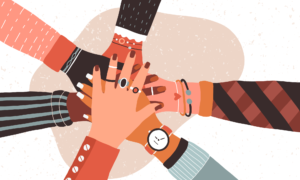
As humans, we often get held up by our differences. Our cultural background, religion, political views, gender identity, or other identifiers differentiate us from each other, but also tend to make it hard to remember what unites us all as humans.
What Brings Us Together?
 When you peel away all of the layers and labels we have placed on ourselves, humanity is defined as “the quality or state of being kind to other people.”
When you peel away all of the layers and labels we have placed on ourselves, humanity is defined as “the quality or state of being kind to other people.”
At its core, the definition of humanity (and how we can be mindful of its importance in our daily lives) is by being empathetic to others. As a healthcare provider, empathy can be especially valuable as you interact with patients on a day-to-day basis, as many of the patients you see can truly benefit from empathy and understanding.
People typically see their doctor because they have an ailment or injury. Others visit their dentist’s office because they have pain that needs to be remedied. Patients are putting trust in their providers, and studies have proven that the best health outcomes are directly related to empathy in the exam room. In fact, 65% of patient satisfaction and improved medical outcomes are linked to patient-perceived physician empathy.
Learn the Language of Empathy
Empathy is the ability to understand and share the feelings of another. As a doctor or dentist, this is a truly powerful and  effective tool. Expressing empathy builds patient trust, calms anxiety, and improves health outcomes. Plus, empathy and compassion are connected with greater adherence to medications, fewer mistakes, decreased malpractice cases, and increased overall patient satisfaction.
effective tool. Expressing empathy builds patient trust, calms anxiety, and improves health outcomes. Plus, empathy and compassion are connected with greater adherence to medications, fewer mistakes, decreased malpractice cases, and increased overall patient satisfaction.
The good news is that empathy is a skill that can be learned, practiced, and improved. The best way to improve your empathetic approach is to learn to speak the language of empathy. Learning the language (verbal and nonverbal actions) can demonstrate to your patients that you care and that you convey an understanding of the most vital connection — that you are human too. Below are clear actionable steps that will help you practice empathy in your daily regimen:
-
Slow down, take your time
In a busy practice, you may feel like you are always working against the clock. Remedy this by taking a pause and asking about how your patient is doing in general, not just from a medical standpoint.
-
Sit down, lean in
Sit down and put yourself at the patient’s level. Doing so will make your patient feel that you are taking the time to listen to and understand their needs.
-
Don’t interrupt
Avoid making assumptions; instead, make observations. Use your five senses to study your patient’s behaviors, and really hear their concerns without speaking over them.
-
Make eye contact
Rather than being glued to a computer in the exam room while entering data, take a few moments to look at and connect with your patient. This is a physical way to affirm that you’re listening and help your patient to be present and feel heard.
-
Put yourself in the patient’s shoes
 It is very likely that your patients have been waiting a while to see you. Perhaps they were afraid of a negative diagnosis or needed to take time away from work to make the appointment. Imagine the situation from your patient’s perspective. The short video from Cleveland Clinic summarizes the idea of empathy beautifully in a video of theirs that went viral a few years ago: “Empathy: The Human Connection to Patient Care.”
It is very likely that your patients have been waiting a while to see you. Perhaps they were afraid of a negative diagnosis or needed to take time away from work to make the appointment. Imagine the situation from your patient’s perspective. The short video from Cleveland Clinic summarizes the idea of empathy beautifully in a video of theirs that went viral a few years ago: “Empathy: The Human Connection to Patient Care.”
-
The goal never changes – you want the best outcome for your patients.
Employing empathy, one patient at a time will advance humanism in healthcare. Place an emphasis on empathy in your practice, and keep it in your toolbox right next to the knowledge, processes, and procedures you learned in medical or dental school and through the course of your experience. Adding this tool will not only help your patients, but it will help you excel at being the greatest provider you can be.
We Are Human Too
 We love helping clients achieve their goals. By leading with empathy and following through with emotional intelligence, we are able to connect and communicate better with our clients — and great communication is the key to problem-solving and long-term success. If you are inspired to start or continue using the language of empathy in your practice but need counsel to button up the legal side of things along the way, feel free to book a meeting with us — we’d be happy to help.
We love helping clients achieve their goals. By leading with empathy and following through with emotional intelligence, we are able to connect and communicate better with our clients — and great communication is the key to problem-solving and long-term success. If you are inspired to start or continue using the language of empathy in your practice but need counsel to button up the legal side of things along the way, feel free to book a meeting with us — we’d be happy to help.
